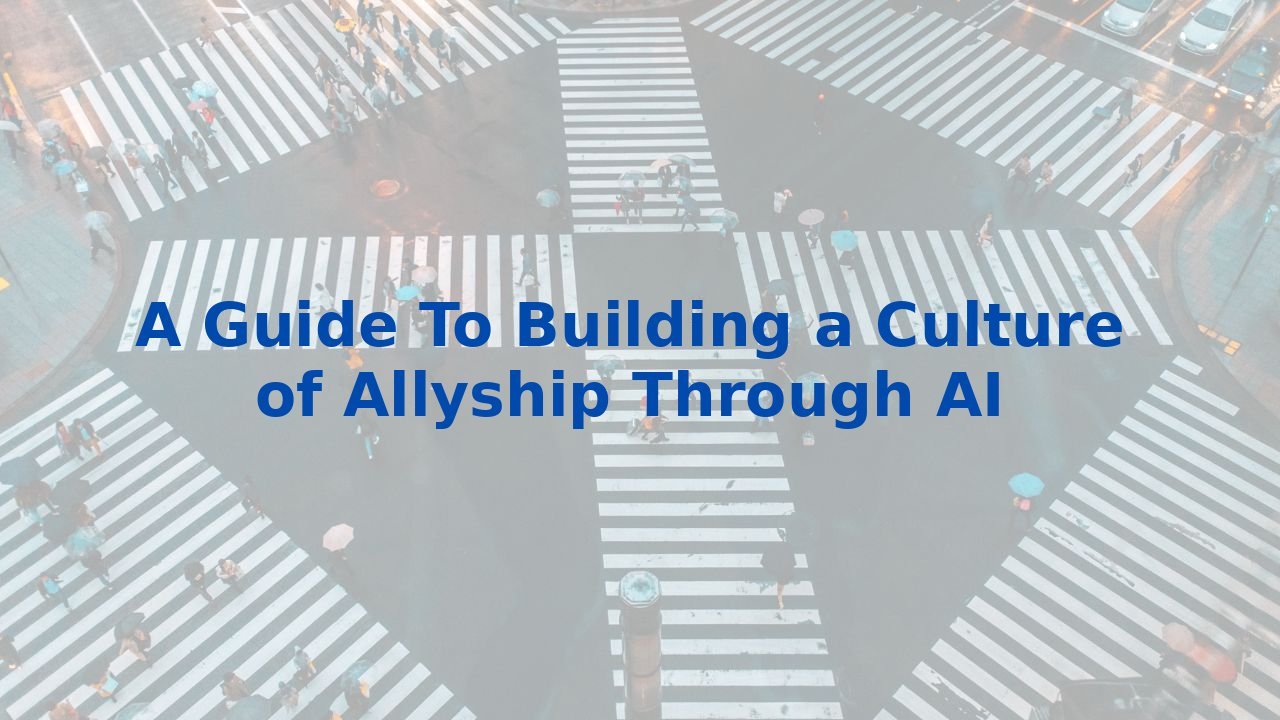A Guide To Building a Culture of Allyship Through AI
A Guide To Building a Culture of Allyship Through AI
In today’s business landscape, a thriving company culture is more than a buzzword; it’s a necessity. It’s the foundation upon which successful organizations are built, and at its heart lies the principle of allyship. A culture of allyship fosters inclusivity, empowers employees, and drives engagement, allowing diverse voices to contribute meaningfully. With the integration of artificial intelligence (AI), organizations can enhance the processes that build this vital culture, thereby reaping significant benefits in efficiency and effectiveness.
The Importance of Building a Culture of Allyship
A culture of allyship is indispensable in promoting diversity, equity, and inclusion (DEI) within a workplace. It involves creating an environment where all employees feel valued, respected, and supported, regardless of their unique backgrounds. Such an environment not only aligns with legal requirements, such as the Equality Act 2010, but also empowers organizations to thrive through the richness of diverse perspectives.
How AI Enhances Organizational Culture
Integrating AI into your organizational processes does more than streamline operations; it actively works to cultivate a culture of allyship through enhanced efficiency. Here are several transformative ways AI can contribute:
- Data Analysis: AI excels at analyzing extensive datasets, particularly in understanding employee interactions, sentiments, and engagement levels. This analysis uncovers trends and patterns that highlight areas requiring attention, allowing for tailored interventions such as targeted training programs and team-building activities.
- Personalized Training: One-size-fits-all training modules can never accommodate the unique needs of each employee. AI-driven personalized training adjusts content based on individual performance and learning styles, ensuring that every employee receives the support required to become an effective ally in their workspace.
- Communication Tools: AI-powered communication platforms foster openness and dialogue among employees. These tools provide a transparent environment to address concerns and share experiences, reinforcing a sense of community and purpose within teams.
- Feedback Mechanisms: Implementing AI-driven feedback systems allows organizations to gather insights about employees’ experiences and perceptions of workplace culture. This immediate feedback creates a data-informed approach to crafting strategies that enhance allyship and inclusivity.
Benefits of AI for Improving Efficiency
Beyond cultural enhancement, the integration of AI dramatically boosts operational efficiency. Here’s how:
- Automated Tasks: By automating mundane and routine tasks, organizations can unshackle human resources and redirect focus to strategic initiatives that require creativity and critical thinking—two vital elements in cultivating a robust allyship culture.
- Predictive Analytics: AI’s ability to analyze historical data equips organizations to foresee future trends and potential challenges. This early identification allows for a proactive approach to addressing DEI issues and fostering an inclusive atmosphere.
- Enhanced Decision-Making: AI provides insights that improve the decision-making process, guiding leaders towards more informed and equitable choices. With complete transparency in data-backed decisions, organizations can cultivate an organizational culture rooted in fairness.
The Importance of Training Employees for AI
While the benefits of AI are plentiful, it is vital to ensure your employees are adequately trained to leverage these tools effectively. Here are key considerations for AI training:
- AI Literacy: Employees need to become familiar with AI tools, understanding their capabilities and limitations. This foundational knowledge is essential to harnessing AI’s full potential effectively.
- Ethical Use: Training should cover the ethical dimensions of AI—addressing topics like data privacy and bias mitigation. Employees equipped with these insights will use AI responsibly, respecting the rights of all individuals.
- Integration into Practices: Effective AI training teaches employees how to weave AI tools into their daily work routines—enabling continuous refinement and adaptation of strategies while utilizing AI to its fullest extent.
Conclusion
In conclusion, crafting a culture of allyship is not only foundational to an inclusive work environment but also essential for the overall success of any organization. By integrating AI into the mechanisms of this cultural evolution, businesses can enhance their efficiency and effectiveness. However, as transformative as AI can be, the training and empowerment of employees to work alongside these tools are equally crucial. Through a concerted effort blending allyship, AI enhancement, and ongoing training, organizations can cultivate a thriving, supportive, and productive workplace for everyone—from the intern to the executive.



